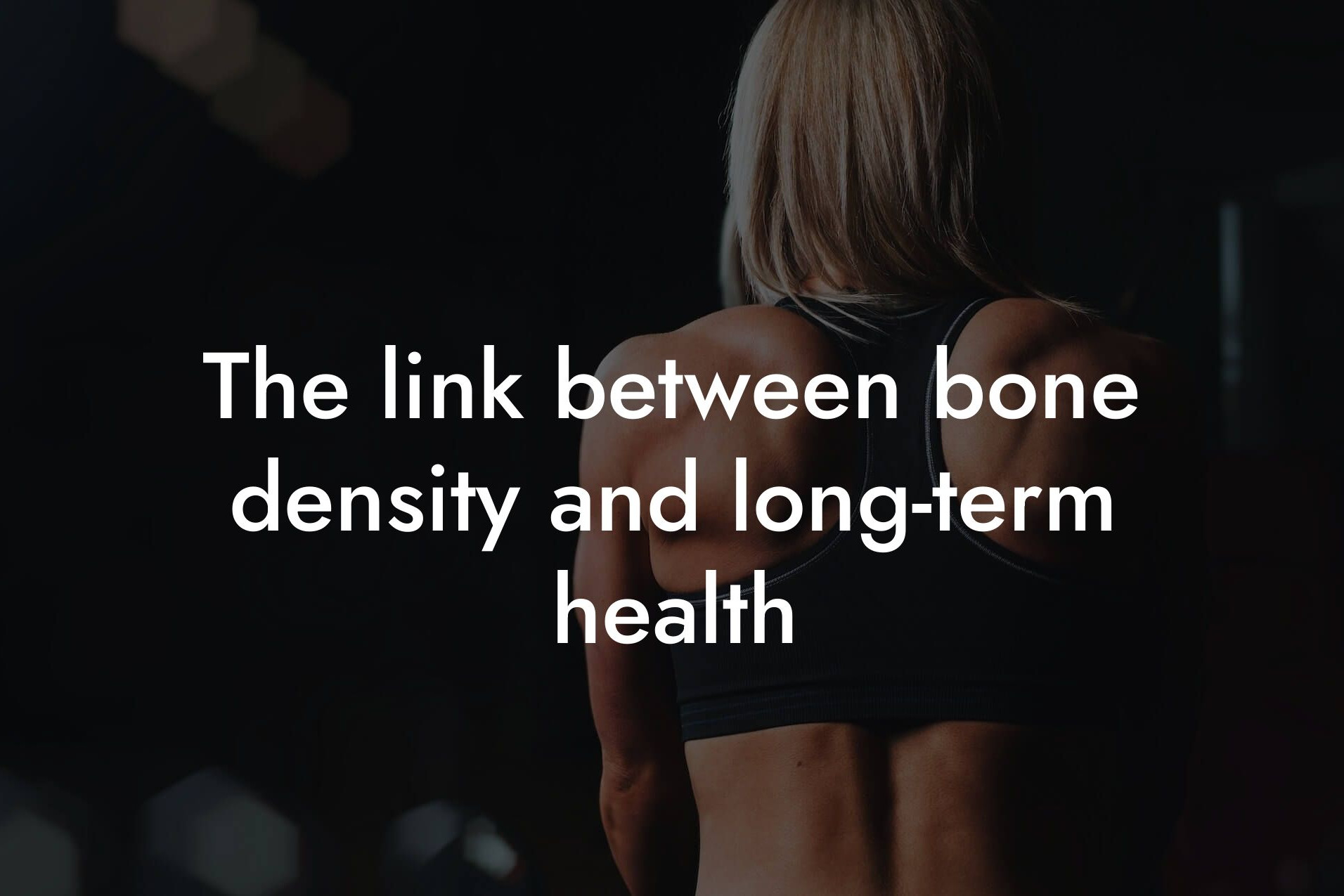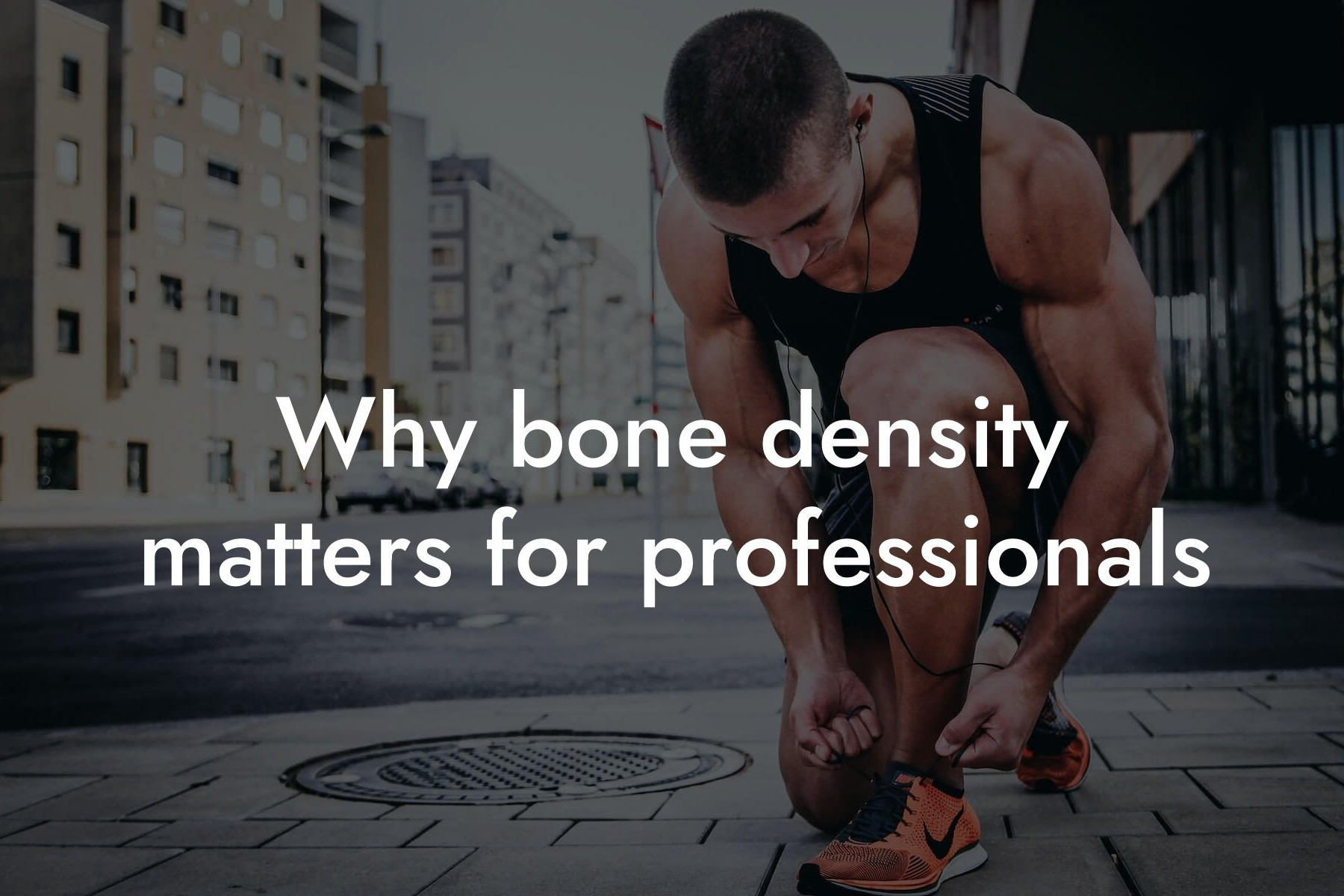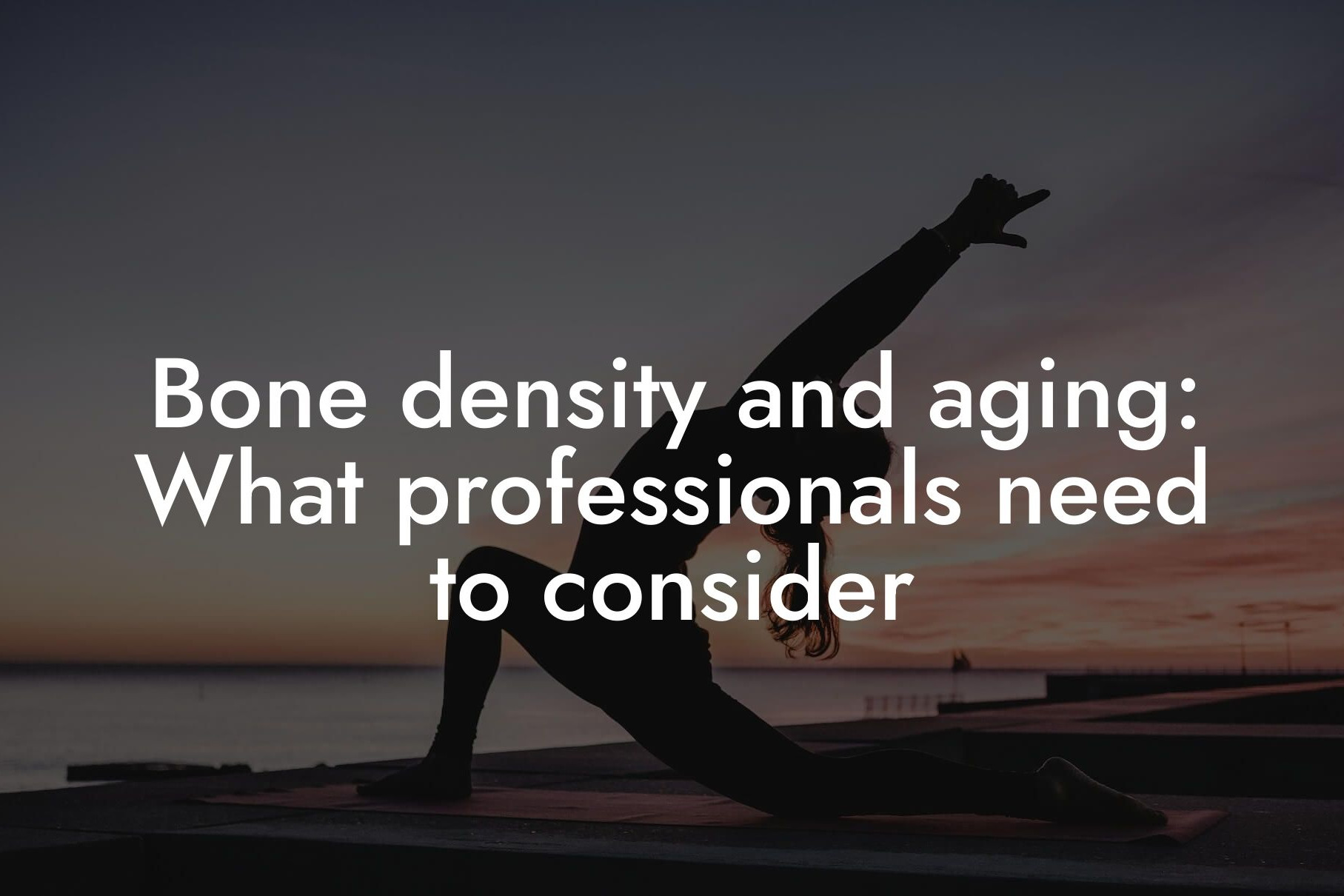As high-earning professionals, you understand the importance of maintaining a healthy and strong physical appearance. One crucial aspect of overall health is bone density, which can have a significant impact on your physique and overall well-being. At Tano Performance Group, we are committed to providing you with the information and tools you need to take control of your bone health. In this article, we will explore the natural ways to improve bone density, helping you to achieve a stronger, healthier you.
Table of Contents
Understanding Bone Density
Bone density refers to the measure of how dense and strong your bones are. It is an important indicator of your overall bone health, and low bone density can lead to osteoporosis, fractures, and other bone-related disorders. Peak bone density is typically reached in early adulthood, and after that, it begins to decline with age. However, there are many natural ways to improve and maintain bone density, even as you age.
The Importance of Bone Density for High-Earning Professionals
As a high-earning professional, you understand the importance of maintaining a strong and healthy physique. Good bone density is essential for supporting your muscle mass, maintaining good posture, and preventing injuries. Moreover, strong bones can also improve your overall athletic performance, allowing you to perform at your best. At Tano Performance Group, we believe that taking care of your bone health is crucial for achieving your fitness goals and maintaining a high level of physical performance.
Nutrition for Bone Health
A well-balanced diet is essential for maintaining good bone health. There are several key nutrients that play a crucial role in bone density, including:
Calcium: This mineral is essential for building and maintaining strong bones. Foods rich in calcium include dairy products, leafy greens, and fortified cereals.
Vitamin D: This vitamin helps your body absorb calcium and maintain strong bones. You can get vitamin D through sun exposure, supplements, and fortified foods.
Phosphorus: This mineral is important for bone growth and density. Foods rich in phosphorus include meat, fish, eggs, and dairy products.
Magnesium: This mineral helps regulate calcium metabolism and is essential for bone health. Foods rich in magnesium include dark leafy greens, nuts, and whole grains.
Potassium: This mineral helps maintain bone density and reduce the risk of osteoporosis. Foods rich in potassium include bananas, avocados, and sweet potatoes.
Exercise for Bone Density
Regular exercise is essential for maintaining good bone health. Weight-bearing exercises, such as:
Running
Jumping
Dancing
Weightlifting
High-impact aerobics
can help improve bone density by stimulating the growth of new bone tissue. Additionally, exercises that focus on strengthening your core and improving your balance can also help reduce the risk of falls and fractures.
Lifestyle Changes for Better Bone Health
In addition to nutrition and exercise, there are several lifestyle changes you can make to improve your bone health, including:
Getting enough sleep: Poor sleep quality and duration can lead to decreased bone density. Aim for 7-8 hours of sleep per night.
Reducing stress: Chronic stress can lead to decreased bone density. Engage in stress-reducing activities, such as yoga or meditation, to help manage stress.
Quitting smoking: Smoking can lead to decreased bone density and an increased risk of osteoporosis.
Limiting alcohol consumption: Excessive alcohol consumption can lead to decreased bone density and an increased risk of osteoporosis.
Supplements for Bone Health
In addition to a balanced diet, there are several supplements that can help support bone health, including:
Calcium supplements: These can help increase calcium intake and support bone health.
Vitamin D supplements: These can help increase vitamin D levels and support bone health.
Omega-3 fatty acid supplements: These can help reduce inflammation and support bone health.
Probiotics: These can help support gut health and increase calcium absorption.
DEXA Scans for Bone Density Measurement
At Tano Performance Group, we understand the importance of measuring bone density to track progress and identify areas for improvement. Our DEXA machine provides a comprehensive body assessment, including bone density measurements, body fat percentage, and muscle mass. With this information, you can tailor your nutrition and exercise plan to optimize your bone health and achieve your fitness goals.
Improving bone density naturally requires a combination of a balanced diet, regular exercise, and healthy lifestyle habits. By incorporating the tips and strategies outlined in this article, you can take control of your bone health and achieve a stronger, healthier you. At Tano Performance Group, we are committed to providing you with the tools and information you need to optimize your physical performance and achieve your fitness goals. Contact us today to learn more about our DEXA scans and comprehensive body assessments.
Frequently Asked Questions
What is bone density, and why is it important?
Bone density refers to the amount of minerals, such as calcium and phosphorus, present in your bones. It's a crucial aspect of overall health, as strong bones support your body's structure, protect internal organs, and enable you to move freely. Maintaining healthy bone density is essential to prevent conditions like osteoporosis, fractures, and osteopenia.
What are the risk factors for low bone density?
Risk factors for low bone density include genetics, hormonal changes, lack of exercise, poor nutrition, smoking, and certain medical conditions like rheumatoid arthritis and celiac disease. Additionally, women, especially those who have reached menopause, are more prone to bone loss due to decreased estrogen levels.
Can I improve my bone density at any age?
Absolutely! While it's ideal to focus on bone health from an early age, it's never too late to take steps to improve your bone density. Even small changes to your lifestyle and diet can make a significant difference, regardless of your age.
What role does diet play in bone health?
A well-balanced diet rich in essential nutrients like calcium, vitamin D, and protein is vital for maintaining strong bones. Foods that are high in oxalates, such as spinach and beets, can inhibit calcium absorption, so it's essential to consume them in moderation. A diet that is deficient in these nutrients can lead to weak bones and increase the risk of osteoporosis.
How does exercise impact bone density?
Regular exercise, especially weight-bearing and resistance training, can significantly improve bone density. Exercise helps stimulate the growth of new bone tissue, increasing bone mass and reducing the risk of fractures. It's essential to incorporate exercises that target different muscle groups and bones, such as squats, lunges, and deadlifts.
What are some exercises that can help improve bone density?
In addition to weight-bearing exercises, activities like yoga, Pilates, and tai chi can also help improve bone density. These low-impact exercises focus on strengthening core muscles, improving balance, and enhancing flexibility, which can reduce the risk of falls and fractures.
Can supplements help improve bone density?
While supplements can be beneficial, it's essential to consult with a healthcare professional before adding them to your regimen. Calcium and vitamin D supplements are commonly recommended, but it's crucial to ensure you're getting the right dosage and type for your individual needs.
How does vitamin D impact bone health?
Vitamin D plays a critical role in calcium absorption and bone growth. A deficiency in vitamin D can lead to weak bones, increased risk of fractures, and osteoporosis. Spend time outdoors, take vitamin D supplements, and consume vitamin D-rich foods like fatty fish, egg yolks, and fortified dairy products to maintain optimal levels.
What is the recommended daily intake of calcium for adults?
The recommended daily intake of calcium varies by age. For adults under 50, the recommended daily intake is 1,000 mg, while those over 50 require 1,200 mg. It's essential to consult with a healthcare professional to determine the right dosage for your individual needs.
Can I improve bone density without taking supplements?
Absolutely! Focus on a balanced diet rich in calcium, vitamin D, and protein, and engage in regular exercise, such as weight-bearing and resistance training. Additionally, maintain a healthy lifestyle by not smoking, limiting alcohol consumption, and managing stress.
How long does it take to see improvements in bone density?
The rate at which you'll see improvements in bone density varies depending on factors like your current bone health, diet, and exercise routine. With consistent effort, you may start to notice improvements within 6-12 months. However, it's essential to be patient and focus on long-term progress rather than quick fixes.
Can I improve bone density in specific areas of my body?
Yes, it's possible to target specific areas of your body to improve bone density. For example, exercises that focus on strengthening your core and hips can help improve bone density in your spine and hips. Consult with a healthcare professional or fitness expert to develop a personalized exercise plan.
How does menopause affect bone density?
Menopause can lead to a significant decline in bone density due to decreased estrogen levels. This can increase the risk of osteoporosis and fractures. Hormone replacement therapy (HRT) and other treatments can help alleviate symptoms, but it's essential to consult with a healthcare professional to determine the best course of action.
Can I improve bone density if I have a family history of osteoporosis?
Yes, even if you have a family history of osteoporosis, you can take steps to improve your bone density. Focus on a balanced diet, regular exercise, and maintaining a healthy lifestyle. Additionally, consult with a healthcare professional to determine the best course of action for your individual needs.
How does smoking affect bone density?
Smoking can significantly reduce bone density, increasing the risk of osteoporosis and fractures. Smoking cessation programs and nicotine replacement therapy can help you quit smoking and improve your overall health.
Can I improve bone density if I have a medical condition?
Yes, even if you have a medical condition like rheumatoid arthritis or celiac disease, you can take steps to improve your bone density. Consult with a healthcare professional to develop a personalized plan that takes into account your condition and individual needs.
How does stress affect bone density?
Chronic stress can lead to increased levels of cortisol, a hormone that can break down bone tissue. Engage in stress-reducing activities like yoga, meditation, or deep breathing exercises to help manage stress and promote bone health.
Can I improve bone density without medication?
Absolutely! Focus on a balanced diet, regular exercise, and maintaining a healthy lifestyle. Additionally, consider alternative therapies like acupuncture, massage, and chiropractic care to help improve bone density and overall health.
How does sleep affect bone density?
Getting adequate sleep is essential for bone health. During sleep, your body repairs and rebuilds bone tissue, so aim for 7-9 hours of sleep per night to support bone health.
Can I improve bone density if I'm overweight or obese?
Yes, even if you're overweight or obese, you can take steps to improve your bone density. Focus on a balanced diet, regular exercise, and maintaining a healthy lifestyle. Additionally, consider consulting with a registered dietitian or fitness expert to develop a personalized weight loss plan.
How does bone density impact overall health?
Bone density has a significant impact on overall health, as strong bones support your body's structure, protect internal organs, and enable you to move freely. Maintaining healthy bone density can reduce the risk of chronic conditions like osteoporosis, fractures, and osteopenia.
What are some common myths about bone density?
Common myths about bone density include the idea that it's only a concern for older adults or that it's solely determined by genetics. However, bone density is a concern for individuals of all ages, and lifestyle factors like diet and exercise play a significant role in maintaining healthy bones.
How can I get tested for bone density?
Bone density tests, such as dual-energy X-ray absorptiometry (DXA), can help determine your bone density. Consult with a healthcare professional to determine if a bone density test is right for you and to discuss the results.
What are some natural remedies for improving bone density?
Natural remedies like vitamin K, magnesium, and omega-3 fatty acids can help improve bone density. Additionally, consider incorporating herbs like turmeric and ginger into your diet, as they have anti-inflammatory properties that can support bone health.
Here are some related articles you might love...
- The link between bone density and long-term health
- Why bone density matters for professionals
- Bone density and aging: What professionals need to consider
- Understanding osteoporosis and its risks
- DEXA scan for bone density: What you need to know
- The role of calcium and vitamin D in bone health
- Best exercises for increasing bone density
- How stress affects bone density
- Nutrition tips for stronger bones
Zak Faulkner
Zak Faulkner is a leading authority in the realm of physical health and body composition analysis, with over 15 years of experience helping professionals optimise their fitness and well-being. As one the experts behind Tano Performance Group, Zak has dedicated his career to providing in-depth, science-backed insights that empower clients to elevate their physical performance and overall health.
With extensive knowledge of DEXA technology, Zak specializes in delivering comprehensive body assessments that offer precise data on body fat, muscle mass, bone density, and overall physique. His expertise enables individuals to make informed decisions and achieve their fitness goals with accuracy and confidence. Zak’s approach is rooted in a deep understanding of human physiology, combined with a passion for helping clients unlock their full potential through personalised strategies.
Over the years, Zak has earned a reputation for his commitment to excellence, precision, and client-focused service. His guidance is trusted by top professionals who demand the best when it comes to their health. Whether advising on fitness programs, nutritional strategies, or long-term wellness plans, Zak Faulkner’s insights are a valuable resource for anyone serious about taking their health and fitness to the next level.
At Tano Performance Group, Zak continues to lead our Content Team revolutionising how professionals approach their physical health, offering unparalleled expertise that drives real results.




